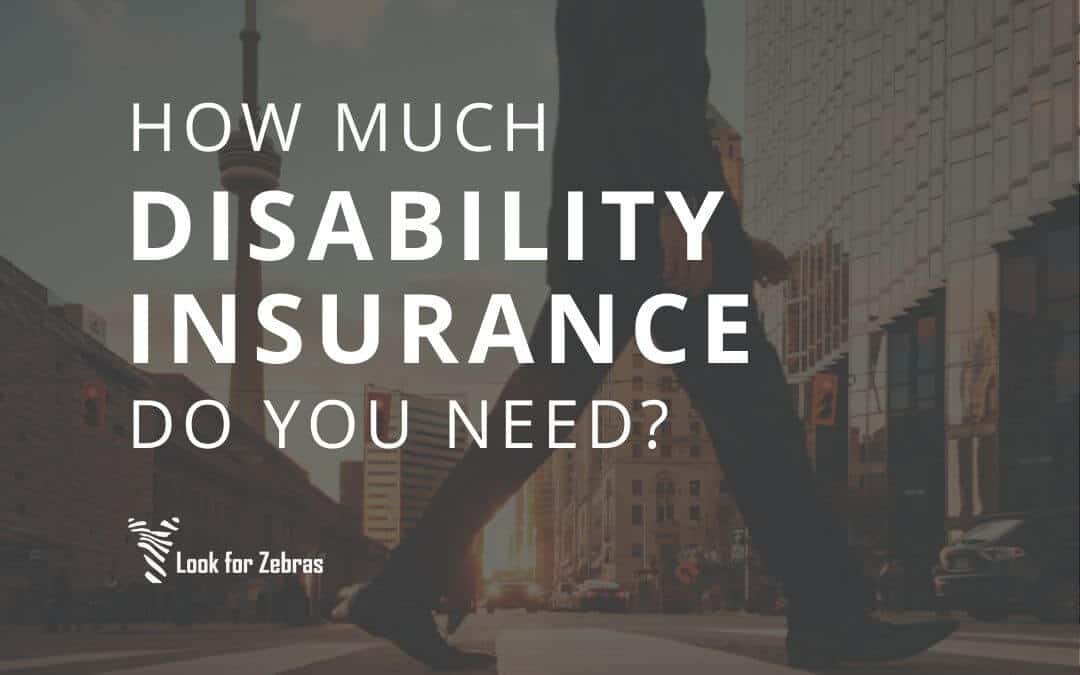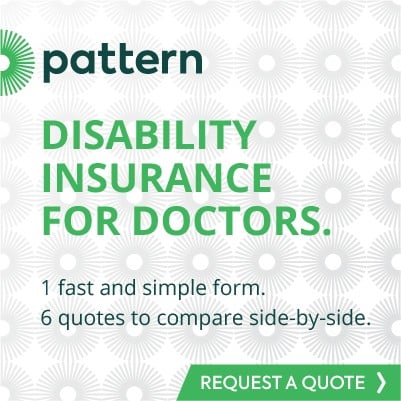Published by Lookforzebras
- The “right” amount of disability insurance for doctors
- Why do you need disability insurance in the first place?
- Is your current income the same as the income you need?
- What are your financial liabilities and assets?
- Would you still work if you couldn’t do the work you’re doing now?
- How old are you and what are your retirement plans?
- The best physician disability insurance considers your unique situation
One of the toughest questions faced by physicians when buying disability insurance is how much to get. This article covers how to determine the appropriate amount of disability insurance for doctors, given their unique personal and professional situations.
The “right” amount of disability insurance for doctors
How much disability insurance should you get?
The answer is completely dependent on you and your financial situation.
It’s worth taking some time to consider this question from several angles. If you underbuy, you risk financial catastrophe if you become disabled. On the other hand, buying more disability insurance than you need means that you’ll waste money on premiums every month, which can really add up over time.
Here are 5 questions to consider when determining how much disability insurance you need as a physician or medical professional.
Why do you need disability insurance in the first place?
The reason that physicians need disability insurance is that abruptly losing the income from our jobs can be devastating to us and our families. Many people underestimate their risk of becoming disabled. A disability that inhibits someone from performing the duties of his or her job does happen… pretty often.
So, unless your income is entirely disposable or you’re quite wealthy and can self-insure against disability, you need disability insurance to ensure that you’re financially stable if you are no longer able to work.
The simple fact that you need disability insurance doesn’t answer the question of how much you need, though. Nonetheless, your answer to the underlying question of why you need it in the first place can assist you in figuring out how much you need.
Who would be impacted if you were no longer able to work? Single physicians without dependents can likely purchase less than those with spouses, children, and other family members that depend on their income.
Are you the primary or sole income earner for your household? Doctors earning all or a bulk of the income for their family will, in most cases, need more disability insurance than those in a dual-doctor marriage or with a spouse who also has a high income.
Considering the underlying reasons you need disability insurance – rather than just replacing a salary – is one of the best ways to make sure you’re buying the right amount of disability insurance.
Is your current income the same as the income you need?
Generally speaking, disability insurance will only cover a percentage of your usual income. This is commonly 60%. Many workers (and insurance agents) look at disability insurance as income replacement. Said another way, they buy (or recommend) an insurance product that will substitute 60% of what they’d normally earn.
However, income replacement and income necessity are not the same thing.
You can lower disability insurance premiums significantly by purchasing only the percentage of your usual income that you truly need. Many doctors, as highly compensated professionals, have the flexibility to adjust their expenses. Consider if you’d be willing to do any of the following in the event of a disability:
- Move to a smaller home or a lower cost of living area
- Eat out less and cook at home more
- Go on fewer (or cheaper) vacations
These are just a few of the many ways to cut down on your living expenses. Doctors willing to decrease their monthly expenses can afford to purchase less disability insurance coverage.
There may also be some expenses that you simply won’t have anymore if you’re no longer able to work. These include gas and vehicle expenses for commuting and professional clothing for work. Depending on when and if you expect to return to medical practice, this could also include expenses associated with maintaining your medical license and board certification.
On the other hand, though, there are certain expenses that can increase in the event of disability, such as healthcare costs.
Here’s what to do with this information: Carefully estimate your expenses for a hypothetical case in which you’re out of work due to a disability. Set a fictional budget for your family, including changes to your usual spending habits only if they would be acceptable to you. This – rather than an arbitrary percentage of your current salary – is a solid basis for how much disability insurance you need.
What are your financial liabilities and assets?
In addition to your anticipated expenses in the event that you become disabled, considering your financial liabilities and assets is important to determining how much disability insurance you need.
Disability insurance payouts need not be your only source of money when you’re disabled. Any current savings that can be quickly accessed without excessive penalty can be used to offset disability premiums. Certain assets you own that can be sold could provide a similar source of income that will lead to less dependence on insurance payouts. These include second homes, fancy cars, and expensive jewelry, for instance.
Assets can also be used to generate income. As one example, a second home that can be rented out can be a source of rental income.
On the other end of the spectrum, liabilities need to be considered in determining the extent of disability insurance to purchase. Many liabilities, such as student debt, mortgages, small business loans, and personal loans, are not forgiven in the event of disability. Payments for these must be factored in when thinking about your insurance needs.
One of the few liabilities that may become less of an issue if you become disabled is income tax liability. One of the biggest advantages of buying your own disability insurance (as opposed to getting it through an employer) is that you don’t have to pay income taxes on it. You should think about your post-tax income when considering how much disability insurance you need to buy.
Would you still work if you couldn’t do the work you’re doing now?
This is an extremely important question that many physicians fail to ask themselves when purchasing disability insurance.
If you’ve perused even a handful of other articles on Look for Zebras, you know that I’m a big proponent of doctors being creative in how they use their medical degrees in order to find fulfillment in their careers. In the same vein, we can be creative in how we use our medical degrees in the case of disability.
There are many ways to earn a solid income with the experience and skills you have as a doctor.
A disability that prevents a surgeon from performing surgery doesn’t necessarily prevent him from using his extensive knowledge of the field in another role.
A hospitalist with a medical condition or injury can potentially still perform as, say, a utilization management medical director or medical writer.
Consider if you’d be willing to shift your career to another type of work if you are unable to continue your current job. Even a part-time nonclinical job that pays only a portion of what you previously earned can significantly decrease the extent to which you rely on disability insurance payouts.
In addition to helping you decide how much disability insurance to buy, your answer to this question can impact whether you purchase “own occupation” or “any occupation” insurance.
How old are you and what are your retirement plans?
Your age and retirement plans need to factor into your decisions about disability insurance. Long-term disability insurance policies vary in terms of the number of years they pay out. It could be 3 years, 5 years, 10 years, or until retirement age.
To answer the question of how much disability insurance you need, don’t forget to consider how your retirement planning and savings will be affected by being disabled and the changes in your income that will result. Ask yourself:
- What is the extent of your retirement savings currently?
- How much longer do you plan to work if you don’t become disabled?
- How and how much will you save for retirement if you’re using disability insurance benefits?
Even when disabled, you need to plan for retirement. In some cases, this may mean using a portion of disability insurance payouts for retirement savings.
The best physician disability insurance considers your unique situation
Hopefully the questions above shed some light on how to determine the extent of disability insurance coverage that you need.
Some physicians get roped into purchasing coverage that’s not the best for their personal situation. To avoid this, there are two important things you should not consider when making a decision about disability insurance:
- How much disability insurance your friends and colleagues tell you they have
- How much insurance that an agent says you need without providing you the details to support his calculation
So, what is the perfect number?
The answer depends on your response to each of the questions above.
Unfortunately, though, not all these questions can be answered with certainty. We can’t predict the future. Being flexible goes a long way whenever something unexpected happens in life. It’s great to have calculated out your perfect number, but an attitude of flexibility will get you far in an unanticipated life event or a financial pinch.
Once you’re ready, you can quickly evaluate physician disability insurance plans using Pattern, which does a thorough job of comparing options side by side, helping you understand exactly what you’re buying, and getting you the lowest prices.


